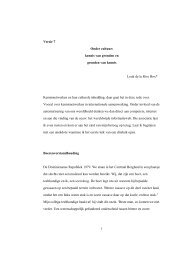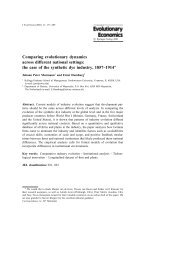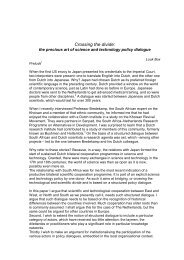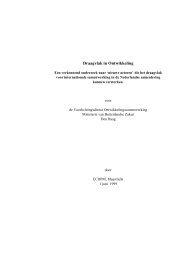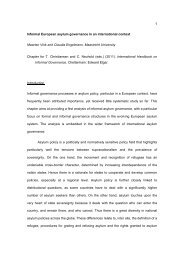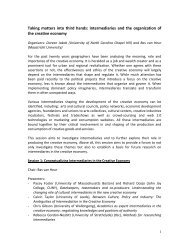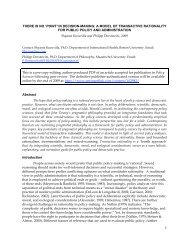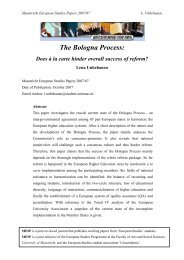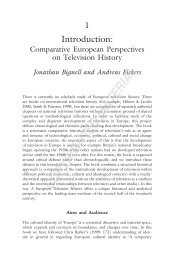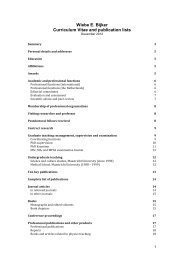Winds of Change: The Europeanization of National Foreign Policy
Winds of Change: The Europeanization of National Foreign Policy
Winds of Change: The Europeanization of National Foreign Policy
You also want an ePaper? Increase the reach of your titles
YUMPU automatically turns print PDFs into web optimized ePapers that Google loves.
Maastricht European Studies Papers 2007/01 Bennet Strang<br />
states in foreign affairs. This might finally lead to the de-coupling <strong>of</strong> the concepts <strong>of</strong> state and<br />
sovereignty (ibid.). Likewise, as the traditional meaning <strong>of</strong> what a ‘state’ constitutes is<br />
increasingly being challenged in the process <strong>of</strong> European integration, so is the traditional<br />
notion <strong>of</strong> state-centric sovereignty.<br />
Nonetheless, an eventual change in the meaning <strong>of</strong> the latter does not necessarily<br />
amount to the generalizing equation ‘<strong>Europeanization</strong> <strong>of</strong> foreign policy=loss <strong>of</strong> sovereignty’<br />
(ibid.). What it gives rise to, however, is the valid question <strong>of</strong> whether one can continue to<br />
apply and stick to the modern Westphalian conception <strong>of</strong> sovereignty, considering the<br />
contemporary foreign policy making style, which is increasingly rooted in inter-state<br />
cooperation and embedded in a European framework (ibid.). Moreover, it has to be asked<br />
whether we are currently witnessing a shift to a post-Westphalian notion <strong>of</strong> sovereignty, <strong>of</strong><br />
which the increasingly Europeanized and post-modern conduct <strong>of</strong> foreign policy might be<br />
indicative. In order to prepare the basis for answering this question, light will be shed on the<br />
nature <strong>of</strong> the concept <strong>of</strong> foreign policy in the following section.<br />
3. At the Heart <strong>of</strong> Sovereignty – <strong>Foreign</strong> <strong>Policy</strong><br />
<strong>The</strong> purpose <strong>of</strong> a nation’s foreign policy should be power, strength and influence in<br />
furtherance <strong>of</strong> its interests and beliefs. That purpose never changes. But the context in which<br />
it is pursued does. 6<br />
Indeed, the context has changed, as outlined with regard to the supposed transformations <strong>of</strong><br />
the sovereignty concept. Before focusing on the changed environment in which foreign policy<br />
is contemporarily conducted, the very concept must be addressed first. <strong>The</strong> reader will notice<br />
that the concepts <strong>of</strong> sovereignty and foreign policy are both intimately intertwined and<br />
complementary. However, what is ‘foreign policy’?<br />
<strong>The</strong>re is no fast answer to this question, as there are multiple definitions, giving rise to<br />
a certain conceptual ambiguity (Carlsnaes, 2002). Choosing a definition, however, is<br />
“…crucial in circumscribing the field <strong>of</strong> investigation” (Manners/ Whitman, 2000, p. 2). On<br />
the one hand, it must be narrow enough in order to be workable, while it should also not be<br />
too narrow on the other hand (ibid.). In its simplest form, foreign policy refers to the external<br />
activities and relations <strong>of</strong> a sovereign state with other states in pursuance <strong>of</strong> its objectives in<br />
the international community (Manners/ Whitman, 2000; Mahncke, 2004; Bátora, 2005).<br />
Opting for a more sophisticated definition <strong>of</strong> the concept, one could say that<br />
6 (Blair quoted in Haugevik, 2005, p. 7)<br />
4



